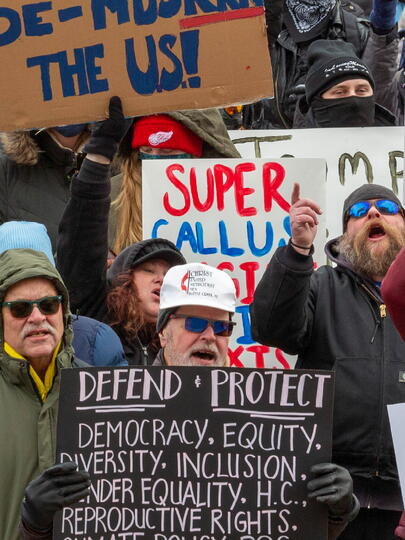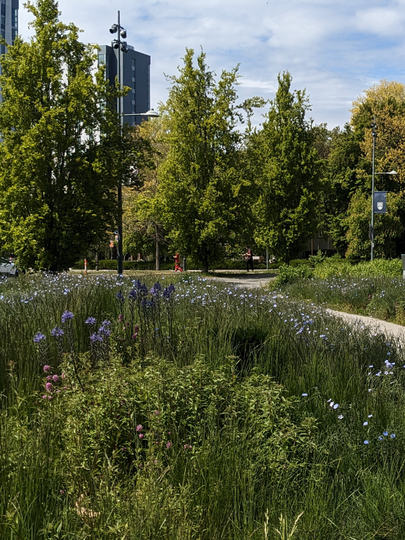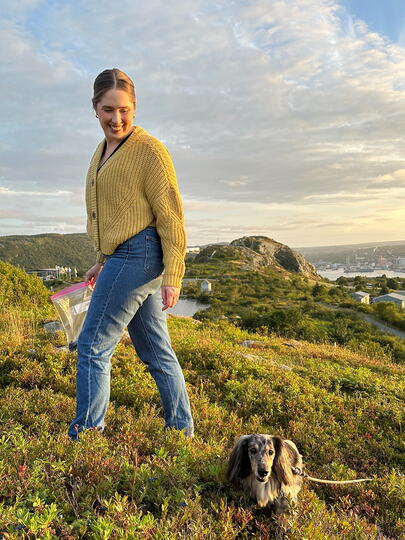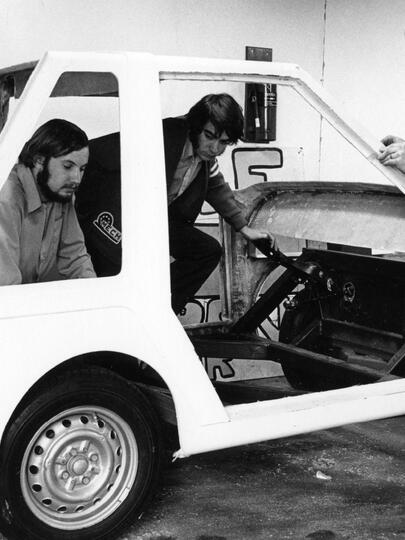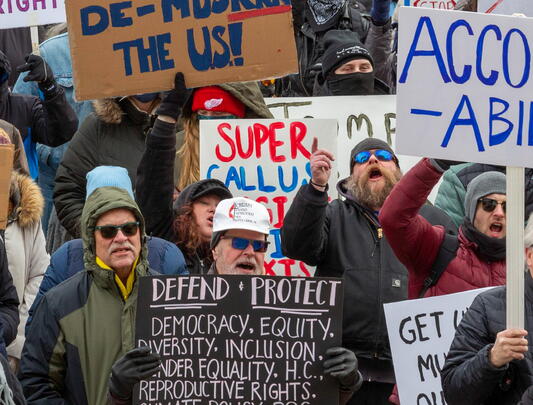Twelve Years to Avoid Catastrophe
Canada is warming at twice the global rate, according to a new report issued by federal scientists earlier this year. That finding follows on the heels of a landmark UN report issued last fall, which warned that humanity has just 12 years to avoid the consequences of catastrophic climate change, from wildfires, rising sea levels, and food shortages.
As the impacts of climate change grow more severe, so too does the scale of the challenge ahead. This requires overhauling our economic policies, changing the way we live our lives and design our cities, and making the climate crisis comprehensible to the public. How can research from the social sciences support this?
We look at how four UBC professors are using insights from behavioural psychology, comparative policy, and environmental economics to advance climate change solutions.
Kathryn Harrison, Political Scientist
Why does carbon pricing remain politically contentious, despite an abundance of evidence that carbon taxes reduce emissions without negatively impacting the economy?
As the Trudeau government launches its federal carbon tax, political scientist Kathryn Harrison is paying close attention. An expert on environmental policy, Harrison has been studying the politics of carbon taxes for a decade.
“Carbon taxes are particularly intriguing, because there’s agreement among policy experts that it’s a great approach for addressing climate change, but also lots of evidence that adoption of a carbon tax is politically hazardous,” says Harrison. “Carbon taxes are ‘good policy’ but ‘bad politics.’ But if that’s the case, why does any government ever propose a carbon tax, and how do at least some of those proposals get implemented and survive?”
Harrison is attempting to answer this by analyzing carbon tax debates in four countries: Canada, Australia, France and Ireland. She’s found that in each of these countries, political opponents have played on voters’ fears and misunderstanding of how carbon taxes work to mobilize opposition, resulting in some ugly political debates. In many instances, that strategy has worked and the people campaigning for robust climate policies have lost elections.
But not always. Harrison has been dissecting the examples in which carbon tax policy has been successful to understand what went well. What conditions or strategies allow pro‑environmental policy to prevail? “Sometimes that’s been through multi‑party collaboration, sometimes by leading with benefits to the economy rather than the environment, and sometimes, to be honest, it’s just been luck,” she says.
Harrison says it’s an exciting topic in Canada right now, given the launch of the federal carbon tax in four provinces. She’s noticed opponents using the same arguments and tactics from previous debates in Canada and elsewhere. “Most of what’s being said is either selective (for instance, ignoring that tax rebates will leave most families in provinces subject to the federal carbon tax better off), misleading in pretending that we can meet our targets by focusing only on big industrial polluters, or just wrong in stating that carbon taxes don’t work.”
But Harrison is watching to see if Canada’s carbon tax rebates will make a difference, noting that most taxpayers will get more money back than they will pay. “Will voters even notice that they’re getting money back, and if they do, does that affect their opinion of the federal carbon tax? I’m also curious whether voters will be influenced by information and evidence as the political debate over the carbon tax unfolds in the months to come. Will they have a reasonably accurate understanding of the costs and benefits they face, or will they just take their signals from the parties they trust?”
To assess this, Harrison and her colleagues are surveying a group of Canadians at several intervals: before the carbon tax takes effect, after the tax is first applied, and after they get rebates through their taxes. “Our goal is to learn whether voters understand and support the carbon tax, and what difference the dividend cheques make.”
Why is climate change a topic you’ve devoted your career to?
Climate change is arguably the greatest challenge humankind is currently facing. I feel a sense of obligation to use my good fortune – born into a wealthy country, access to a top‑notch education, and security of a tenured academic position – to do what I can to make things better for those less fortunate and future generations. I hope that my research and public scholarship can contribute in a small way.
If there was one solution or recommendation that you would like people to take away from your climate research, what would it be?
On climate change, there’s been a really unhelpful dance between Canadian voters and politicians for more than three decades, even as our emissions have gone up and up. Politicians don’t believe that voters will support them if they propose the kinds of policies needed to deliver real change, so they offer truisms like “the environment and economy go hand in hand” and adopt feel‑good policies that help a bit at the margins but don’t challenge our fossil fuel dependence.
In turn, most voters readily embrace the message that we can save the world without changing our lives. They reject policies – like carbon taxes – that have even modest impacts on them. If we’re going to fix this problem, something has to give. Either political parties have to agree that this issue is just too important for partisan opportunism, or voters have to accept that fundamental change is needed and vote for candidates who are honest about that.
As part of Congress 2019 (see page 48), Kathryn Harrison will chair an open panel event on “Climate Change Mitigation: Carbon Pricing in the Canadian Federation.” The event takes place on June 4, 8:30 ‑ 10:30 am in the AMS Nest. Details: congress2019.ca/calendar/1090
Patrick Baylis, Economist
How will the economy and society adapt to a warmer, more variable world? What can governments do to put a price on the true cost of pollution and assign a value to natural resources like forests and biodiversity? These are questions driving Patrick Baylis’ work. An environmental economist at the Vancouver School of Economics, Baylis has dedicated his career to uncovering the economic costs of climate change.
And to better understand the impact that climate change is having on society, Baylis has worked on a series of studies harnessing massive amounts of demographic and social media data. Together, these studies paint a fascinating and troubling picture of how humankind is responding to global warming.
The Human Cost of Climate Change
In a 2018 study, Baylis and his colleagues analyzed the link between extreme weather and human well‑being through the lens of 3.5 billion Facebook and Twitter posts shared between 2009 and 2016. Using sentiment analysis tools, they counted the number of positive and negative words contained in each post, then compared this to meteorological data from each location. They found that negative sentiment increased significantly during extreme weather (weather that was too hot, cold, wet, or humid).
It was the biggest ever study quantifying the link between bad weather and emotional state, and it prompted another question: Will people simply get used to more challenging weather patterns and adjust their happiness?
To understand this, Baylis and colleagues followed up with a 2019 study that analyzed more than 2 billion geolocated tweets between 2014 and 2016. This time, they wanted to know if people would continue to notice extreme weather after repeated exposure, as well as if it continued to impact their moods.
They found that the likelihood of remarking on extreme weather declined rapidly if people had already experienced similar temperatures in recent years, even if that weather was extreme in the context of a larger time frame (they compared it to a baseline of the 1981‑1990 average temperatures for those areas). Their findings suggest that people had normalized extreme weather in as little as two years.
Significantly, even though people were no longer remarking on the weather after repeated exposure to historically unusual temperatures, they were still expressing negative sentiments. They had stopped talking about the bad weather, but it was still making them unhappy.
This is concerning for two reasons. If people stop registering extreme weather as extreme, they may underestimate the impact of climate change and be less likely to support climate change solutions. (Baylis and his team noted this was a classic case of the boiling frog metaphor.) Secondly, even though people are not necessarily attributing their negative feelings to extreme weather, they’re still worse off.
Higher Temperatures Increase Suicide Rates
This decline in well‑being was dramatically underscored in a third study co‑authored by Baylis that indicated a rise in suicides due to global warming. Using comprehensive data from multiple decades, Baylis and coauthors found that when the average monthly temperature increased by 1 degree Celsius, the suicide rate rose by 0.7 per cent in the US and by 2.1 per cent in Mexico. Those margins are comparable to the estimated increase in suicide rates linked to economic recessions, and to the decrease in rates attributed to suicide prevention programs and gun restriction laws.
Additionally, the effect had not diminished over time, suggesting limited human adaptation to hotter weather. The authors predicted that the rise in suicides would only increase in a rapidly warming world, with as many as 40,000 additional suicides by 2050 in the United States and Mexico. “This is another really tragic cost of climate change,” says Baylis.
His current work tries to measure how people are incentivized to make climate‑friendly decisions. Specifically, he is looking at how government‑funded fire suppression in the US implicitly subsidizes construction in remote, less‑dense areas with high fire risk. If people choose to build their homes in areas with a high fire risk, should they pay more to offset the cost of public‑funded fire suppression? If there is no additional cost, they are essentially getting an implicit subsidy to live there, Baylis says. He wants to calculate the value of that implicit subsidy. “This is important because climate change is already contributing to increasingly dangerous and costly fire seasons,” he says. “A better understanding of how these public expenditures change homeowner incentives will help us better mitigate these impacts.”
Why is climate change an area you’ve devoted your career to?
I think it’s because environmental economics gets at two big fascinations of mine: how people make decisions in the face of scarcity (that’s the economics part) and how we value our public resources like good air quality, healthy ecosystems, and access to the outdoors (those are the environmental parts).
What’s the one thing you’d like people to take away from your work?
One concept that I hope students who take my class walk away with is that pricing externalities [e.g. putting a price on pollution] is complicated and difficult but also incredibly important. We’re not precisely certain what the exact social cost of carbon is (and we may never be), but at this point it’s very clear that it’s substantially greater than zero. As Canadian residents, we are lucky to live in one of the few countries in the world with a price on carbon emissions – as global citizens, we should be interested in the whole world moving in that direction.
Seth Wynes, Geographer
What individual lifestyle choices have the highest impact on climate change? A 2017 study by environmental geographer Seth Wynes showed that the four most impactful actions that individuals can take to lighten their carbon footprint are (in order of impact): having fewer children, living car free, reducing air travel, and switching to a plant‑based diet.
If those findings surprise you, it might be because they’re not the strategies most commonly promoted by governments, educators and the media. In fact, when Wynes analyzed a representative sample of educational materials (including 10 Canadian high school textbooks) as well as government resources on climate change from the EU, US, Canada and Australia, he found they largely fail to mention these actions. Instead, they focus on things like recycling, switching light bulbs or using cloth shopping bags – actions that have a relatively minor impact on emissions.
Wynes, a former high‑school science teacher, was puzzled by this. After all, avoiding just one roundtrip transatlantic flight per year reduces more emissions than switching to green energy. Adopting a plant‑based lifestyle is four times more impactful than comprehensive recycling and aligns with healthcare advice. And a US family choosing to have one less child would result in the same level of emissions reductions as 684 teenagers adopting comprehensive recycling for the rest of their lives. So why are governments telling people to switch their light bulbs instead of encouraging them to fly less and reduce their meat intake?
Wynes suggests the messaging may have been designed with a “foot in the door” approach. “If you start people on small actions that are easily achievable, then they can be scaled up later,” he says. “But it’s time to move onto the next stage.” He says it’s critical to revamp our educational materials to promote high‑impact strategies, especially those targeted at young people who are establishing lifelong patterns.
Case Study: Reducing Business‑Related Air Travel at UBC
Currently, Wynes is investigating what might nudge people from knowledge about climate change mitigation to pro‑environmental actions. His latest research looks at a case study close to home: the carbon impacts of business‑related air travel at UBC.
It may sound like small fry in the context of climate change mitigation, but the impacts would be huge: his study found that business‑related air travel emissions at UBC could be equal to a whopping 63‑73 per cent of the total annual emissions from operating the UBC campus. In Wynes’ home department, emissions from business‑related air travel by faculty members was 30 times greater than emissions from running the geography building.
“We know that air travel generates a lot of emissions, while UBC’s campus emissions are small for a university this size,” says Wynes, “so it’s not surprising that business air travel has such a big footprint at UBC. Going forward air travel is going to be one of the last big sustainability hurdles for any university.”
Wynes understands that academic life involves a lot of travel – conferences in faraway places, lectures across the globe. But would people cut down on air travel if they knew more about the carbon impacts of their travel choices and were given better options for meeting virtually with their colleagues around the world?
“I’m trying to figure out how people view their own air travel, how organizations can encourage low‑carbon alternatives, and whether professionals can fly less without making career sacrifices,” says Wynes. “Air travel is such a carbon‑intensive personal action, so it’s really worthwhile to look at different ways that we can reduce demand and help people do their jobs well without taking so many flights.”
Based on the findings from their UBC case study, Wynes and his coauthor and supervisor Simon Donner have proposed a roadmap for public sector institutions looking to reduce greenhouse gas emissions from air travel (and as a side benefit, cut costs). This includes better tracking and communication of air‑travel related emissions, improving video conferencing facilities, requiring economy‑class travel (choosing a higher class was responsible for 8 per cent of emissions), and reducing flights solely for lectures.
Wynes is now partnering with UBC Travel and UBC Sustainability and Engineering to use the university as a living lab for curbing business‑related air travel. “What we learn about how to cut emissions from business air travel can hopefully be used by other universities and institutions around the world,” he says.
Why is climate change a topic you have decided to devote your research and time to?
We are in a crucial window of time where we can decide what kind of future we will live in, and it’s important that we choose one where the atmosphere is compatible with human well‑being. That gives me motivation to get up in the mornings.
If there was one solution or recommendation that you would like people to take away from your climate research, what would it be?
My number one recommendation to individuals would be to go big. So many of the actions that are suggested by the media are chosen because they’re small and they’re easy, but this problem is not small and it is not easy. Take trains, not planes, eat a plant‑based diet and live car free!
As part of Congress 2019 (see page 48), Seth Wynes will participate in a panel entitled “Green Academe: How can our carbon footprint‑related actions in academia create meaningful change?” The event takes place on June 5, 8:30 ‑ 10:00 am in the AMS Nest. Details: congress2019.ca/calendar/1257
Jiaying Zhao, Psychologist
Why does climate change remain such a polarizing topic? And what interventions could be made in our cities to encourage pro‑environmental behaviour? As Canada Research Chair in Behavioural Sustainability, psychologist Jiaying Zhao uses insights from behavioural psychology to address these kinds of sustainability problems.
Engaging Climate Change Skeptics
Her recent work seeks to understand how to engage conservatives who remain skeptical about climate change. “Political groups view climate change in very different ways,” says Zhao. “You have liberals who are worried about climate change and conservatives who are skeptical and don’t believe it’s driven by human activity. Yet the two groups are looking at the same scientific evidence. So our question is, why is information alone not convincing people? Why do you see this divergence of views and opinions given the same evidence?”
Zhao wondered whether the differences arise in part from an attentional bias driven by political orientation rather than insufficient exposure to climate facts. So in a recent study, she and her colleagues tested people’s visual attention to climate‑change related words (words like “carbon” or “warming”). They discovered that participants who were already concerned about climate change were better at seeing those words, while those who weren’t concerned didn’t pay any more attention to climate words than to neutral words like “table” or “chair.” Zhao says this can create a feedback loop where concerned individuals are better at tuning their attention to climate news, which leads them to become more concerned.
For Zhao, this has enormous implications for communication. “You cannot engage conservatives on climate change in the same way you can with liberals,” she says. Zhao suggests that for climate messaging to be effective, it should align with people’s personal values and political ideologies. So for conservatives, this might require framing climate change action as a tool for advancing economic and technological development, or protecting the nation against threats like rising sea levels or wildfires.
Environmental Interventions
Zhao’s other research has examined how small interventions can encourage recycling, composting and car sharing. She says that simply being aware of what contributes to climate change is often not enough to change behaviour, but making pro‑environmental actions convenient and accessible can make a big difference. For instance, she and her colleagues showed that minimizing the distance between the recycling bin and suites in a multi‑unit residential building improved recycling and composting rates by 60 to 130 per cent.
Why is this an area you chose to work on?
Because it is absolutely necessary! Human activity has caused adverse impacts on Earth’s ecosystems and created a myriad of environmental problems. Sustainable development ultimately depends on changing human behaviour. So I think there is a tremendous space for psychology to contribute to sustainability.
If there was one solution or recommendation that you would like people to take away from your research, what would it be?
Make it easy and fun. For example, if cities can make public transit or car sharing services more convenient, that will encourage fewer people to drive, which will support our transition to a more sustainable world.
